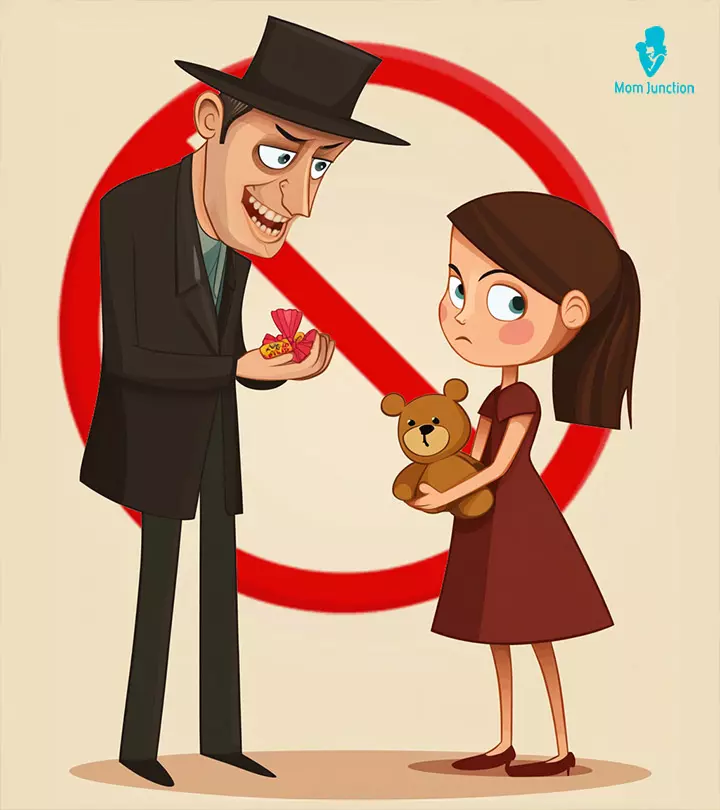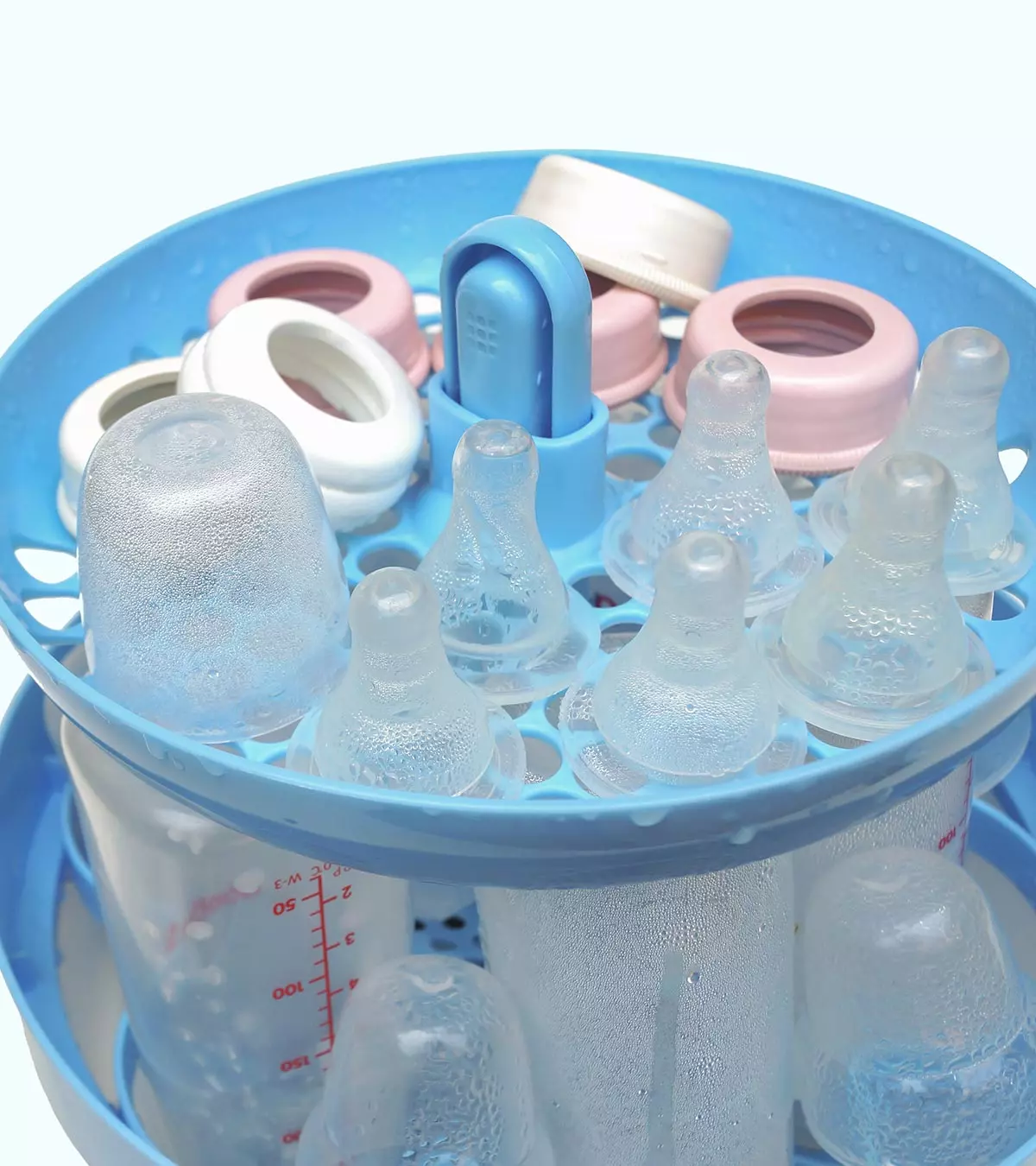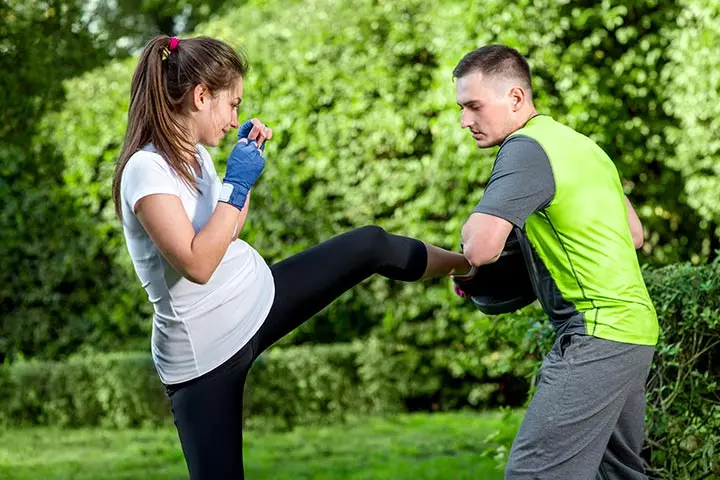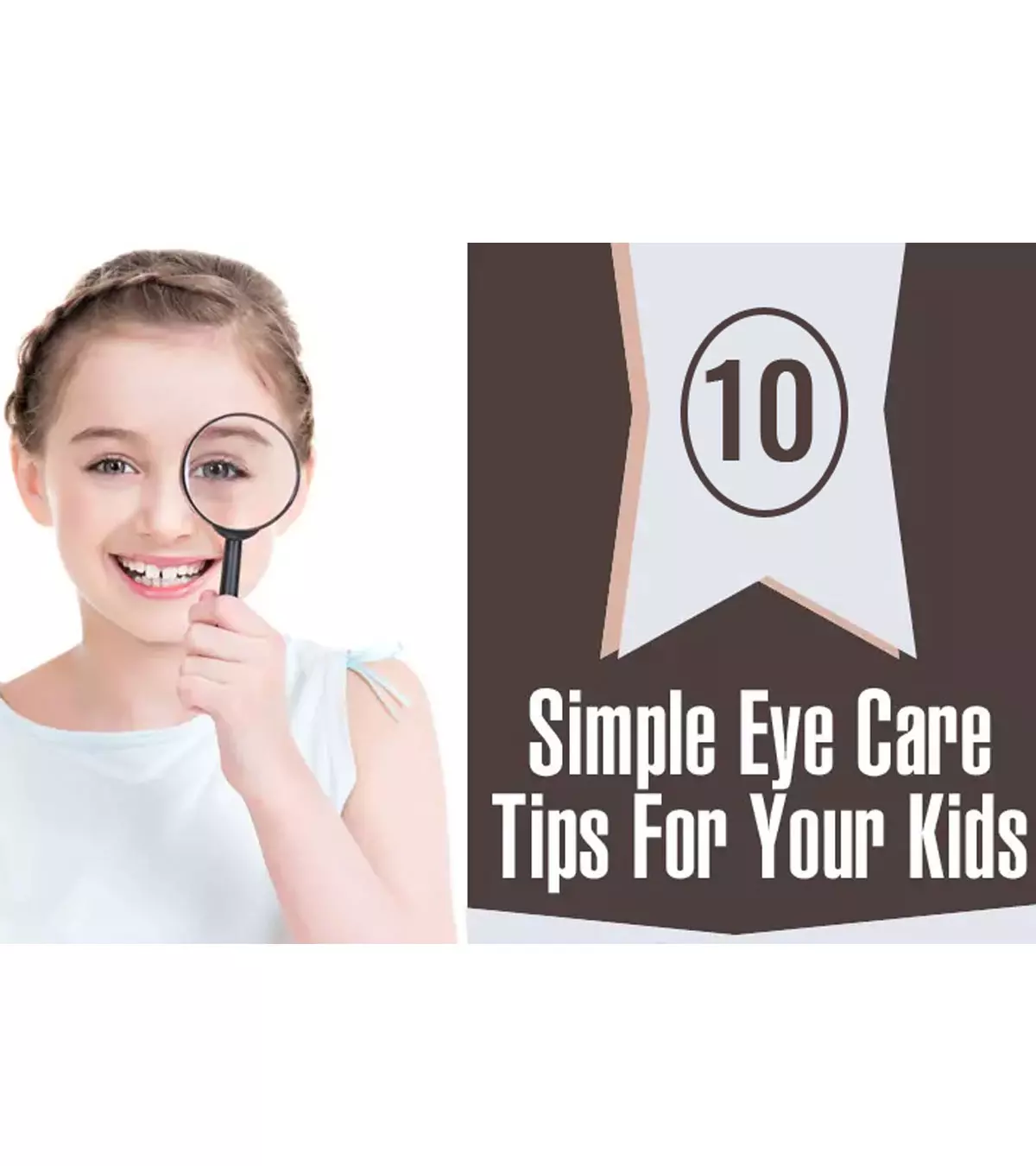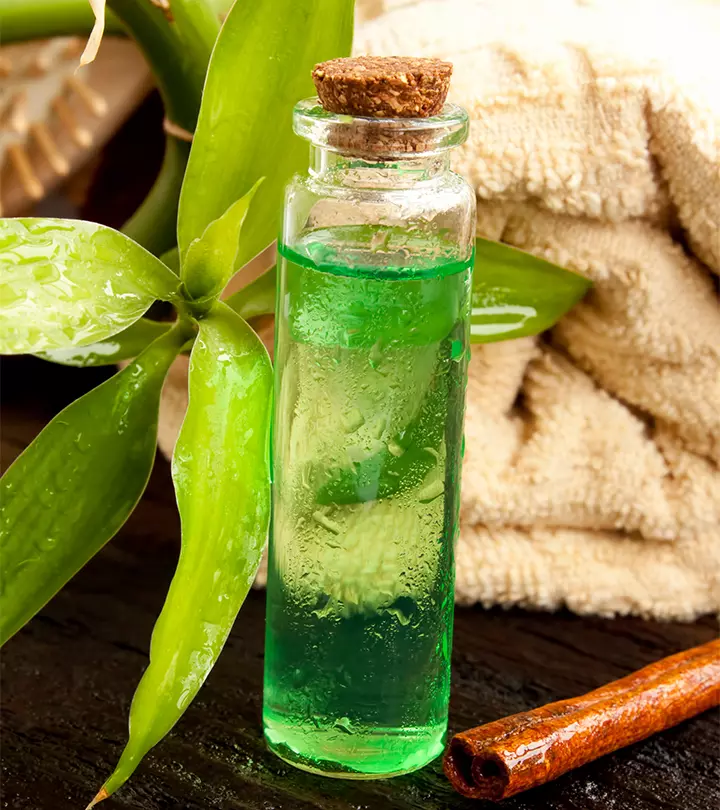
Image: iStock
Tea tree oil is an essential oil derived from tea tree leaves. It possesses antimicrobial, antiseptic, antibacterial, anti-inflammatoryiDrugs or substances that reduce inflammation or pain , and immuno-stimulatingiSubstances that stimulate or increase immunity effects(1). and is often used for aromatherapy. You can safely use tea tree oil for kids under the guidance of experts who can tell the proper dosage and the right mode of administration (topical application or inhalation) for children. They can also advise you about some trustable brands to buy from.
The US Food And Drug Administration (USFDA) doesn’t regulate essential oil sale or use (2). Hence, finding a safe and effective product is tricky. You may find tea tree oil in over-the-counter (OTC) products, as a natural remedy for certain skin care routines. It is often found in products such as face washes and mosquito repellents, but since only a small amount is incorporated, it usually has no adverse effects. However, when it comes to using tea tree oil directly, caution is advised.
Read on to learn whether tea tree oil is safe for children and its possible uses and side effects.
Key Pointers
- Tea tree oil effectively fights against microbes, reduces inflammation, and boosts the immune system.
- Tea tree oil should be diluted when using it for children. A patch test must be conducted to check for skin allergies.
- Tea tree oil helps treat sinus infections, nasal congestion, and bronchitis.
- Its antiseptic properties help treat cuts, bites, and wounds.
Tea Tree Oil For Children: Safety Aspects To Consider
- Make sure the brand you are choosing is known for its non-toxic and gentle properties. Check the labels for ingredients, and prefer the ones made from organic sources.

Image: Shutterstock
- The American College of Healthcare Sciences suggests diluting the oil when using it for children (3). For instance, you can blend three to five drops of tea tree oil with an ounce (30ml) of carrier oil such as jojoba, argan, almond, coconut, and avocado.
- Perform a patch test before using it. Apply the oil on a tiny patch of skin to observe the skin’s response. If the child has any allergies or they are too sensitive, then it is better to avoid the oil.
 Point to consider
Point to consider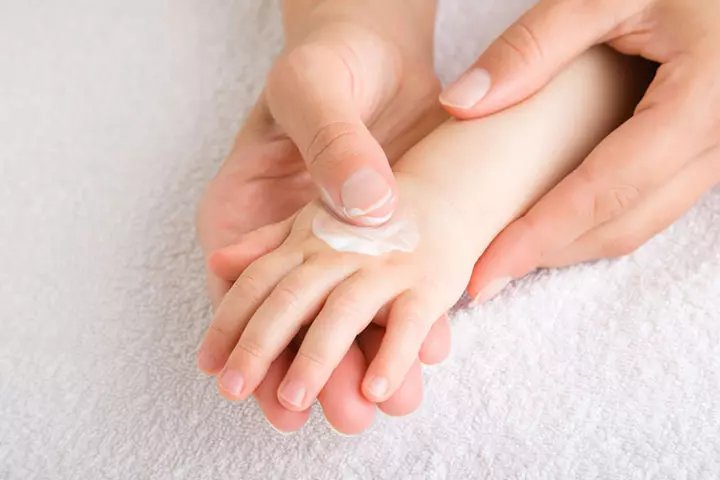
Image: Shutterstock
- As per a report by the University of Maryland, tea tree oil might cause detrimental health effects on oral use (4).
If you decide to use tea tree oil after conforming to the safety considerations, then it is good to know about the likely uses and limitations of the oil.
Possible Uses Of Tea Tree Oil For Children
The topical useiApplication on the skin of tea tree oil for children may provide relief in the following ways.
- According to the American College of Healthcare Sciences, tea tree oil is safe and can be useful for children for sinus infection, nasal congestion, and bronchitisiAn inflammation of the airways (the trachea and the bronchi) due to mucosal infection that makes breathing difficult (5). Children above five years of age can inhale steam from water that has a few drops of tea tree oil (three to five drops for around six cups of water). For children below five years of age, leave a bowl of water in the child’s room so that the tea tree oil-mixed steam can spread into the ambient air.
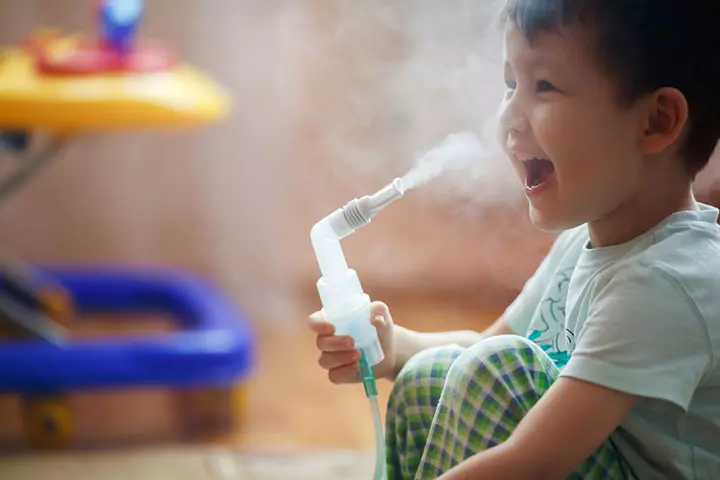
Image: Shutterstock
- According to a study, tea tree oil, when used in mouthwashes, resulted in a decrease of gingivitisiA mild gum disease that causes redness, irritation, and swelling of the gums and plaqueiA sticky film on the teeth that can cause gingivitis and other oral diseases in the oral cavity of children as well as prevented tooth decay (6).
- Tea tree oil contains antiseptic properties, and it is used for cuts, bites, and wounds (7). Basically, it reduces inflammation and potentiates the effect of white blood cells, which improves healing of wounds and has a soothing and calming effect overall.
- A University of Michigan report states that tea tree oil can be a home remedy for fungal infectionshome remedy for fungal nail infection (8). A fungal nail infection in children generally takes a long time to heal, and tea oil can help expedite the process. But there is no reference to its use in children.
- A research study has found that “The cumulative acaricidaliThe property that allows a substance to combat harmful mites , antibacterial, antipruritic, anti-inflammatory, and wound healing effects of TTO may have the potential to successfully reduce the burden of scabiesiAn extremely itchy skin inflammation caused by a mite called Sarcoptes infection and the associated bacterial complications”(9).
- Some parents add a few drops of tea tree oil in the hair oil of children to address head lice and reduce dandruff. But its effectiveness is not known.
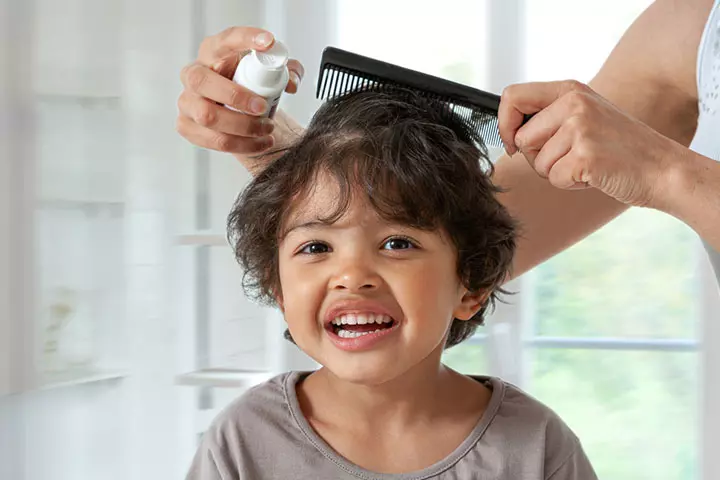
Image: Shutterstock
- Psoriasis is an autoimmune condition and causes red, itchy skin. It is a chronic condition. Tea tree oil, due to anti-inflammatory properties, can reduce the symptoms.
Crystal White, a mother of three, mentions in her blog that tea tree oil could help prevent infections caused by itching. She states, “I like to take one drop (tea tree oil) and wipe it along my baby’s fingernails when she has an itch that she won’t stop scratching. That way, I don’t have to worry about infection (i).”
Skin inflammation due to diaper rash, contact dermatitisiAny skin inflammation that causes itching, rash, dry skin, or irritation or insect bites can also be relieved by applying tea tree oil.
Remember, tea tree oil is not a medicine and not a replacement for a doctor’s advice. Essential oils may work for some kids, while some might have side effects.
 Quick fact
Quick factPossible Side Effects Of Tea Tree Oil For Children
The chief side effects are irritation, allergy, burning and redness of skin. Tea tree oil can be toxic if ingested and should be kept out of reach of children. Some of the likely side effects of tea tree oil are:
- A study has found a link between the use of products (that included tea tree oil and lavender oil) and abnormal growth (prepubertal gynecomastia) of the breast in young boys (10). In one case, the swelling came back to normal once the boy stopped using the product. However, there is a difference of opinion on this and further research is needed to know the exact effects of tea tree oil on abnormal breast growth.
- There have been reports of allergic contact dermatitis with the use of tea tree oil (11). You may have to be extra cautious when using it for children who have sensitive skin.

Image: Shutterstock
- Children have immature livers and thin skin, and they can be more susceptible than adults to the toxic effects of essential oils (12).
- There is limited research data on the toxicity of tea tree oil. However, its excessive use on a child’s skin might be harmful.
Other Gentle Essential Oils For Children
Some gentle essential oils for kids include lavender, blue cypress, sandalwood, ylang-ylang, neroli, and spearmint. However, even the safest oils known could have individual responses (3). So make a careful decision under expert guidance.
Frequently Asked Questions
1. How can I make tea tree oil bug repellent for children?
You can use the following method to make a tea tree oil bug repellent for your children.
- 2 ounces boiled or distilled water
- 1.5 ounces vodka or witch hazel
- 15 drops of tea tree essential oil
- 25-30 drops of citronella essential oil
- 25-30 drops of peppermint essential oil
Fill a clean spray bottle with the ingredients listed above. Shake the bottle well and store it away from direct sunlight and your child’s reach. Spray it on their clothes every two hours. Be careful not to spray it into their eyes, mucous membranes, or open wounds.
2. Can I apply tea tree oil directly to my child’s skin?
It is recommended to avoid applying tea tree oil directly on the skin without an aromatherapist or specialist’s consent. Depending on the underlying condition, a diluted solution of 0.5-2.5% essential oils is considered safe for babies and young children (13).
3. Is tea tree oil good for children with eczema?
It is advised against using tea tree oil to treat or manage children’s eczema, as there is no proof of its effectiveness or safety. In some cases, it may even cause allergies and eczema flare-ups (16) (17).
4. What precautions should I take when using tea tree oil for my child?
Before using tea tree oil, consult with a pediatrician, especially for children under the age of five. Ensure proper dilution with a carrier oil, and avoid using it on broken skin. You should also perform a patch test to check for allergic reactions.
Tea tree oil for kids is one of the many therapeutic essential oils with several health benefits. It may be used for multiple purposes and conditions, including cuts, bites, wounds, dandruff, psoriasis, etc. However, it may also have some side effects and can be toxic if ingested accidentally. So, it is better to consult a doctor before using it, and in case you notice any allergic reactions, you should report it to the doctor immediately. It is recommended to do a small patch test before using it on larger body parts.
Infographic: Using Tea Tree Oil For Children
Tea tree oil should be used among children only after consulting a doctor due to insufficient research about its safety and the potential to cause side effects. Nevertheless, tea tree oil might help treat certain conditions in children, as shared in this infographic. Illustration: Momjunction Design Team
This video explains the amazing benefits and potential dangers of tea tree oil. Discover how to use it safely and effectively for your children’s health and wellness.
Personal Experience: Source
MomJunction articles include first-hand experiences to provide you with better insights through real-life narratives. Here are the sources of personal accounts referenced in this article.
i. The truth about tea tree oil and cloth diapers.https://everythingbirth.wordpress.com/2010/06/15/the-truth-about-tea-tree-oil-and-cloth-diapers/
References
1. B. Ali et al.,Essential oils used in aromatherapy: A systematic review; Asian Pacific Journal of Tropical Biomedicine (2015)
2. M. Patrick,A Doctor’s Take on Essential Oils; Nationwide children’s (2015)
3. M. Green,Herbal and Essential Oil Remedies For Children; American College of Healthcare Sciences (2017)4. Essential Oils; Poison Prevention Press; Maryland Poison Center (2014)
5. It’s Cold & Flu Season – Keep Your Children Healthy; American College of Healthcare Sciences
6. N. P. Kamath et al.,The effect of aloe vera and tea tree oil mouthwashes on the oral health of school children; European Archives of Paediatric Dentistry (2019)
7. R. M. Labib et al.,Appraisal on the wound healing potential of Melaleuca alternifolia and Rosmarinus officinalis L. Essential oil-loaded chitosan topical preparations; plos.org (2019)
8. Fungal Nail Infection, University of Michigan
9. J. Thomas et al.,Therapeutic Potential of Tea Tree Oil for Scabies; The American Journal Of Tropical Medicine And Hygiene (2016)
10. Chemicals in lavender and tea tree oil appear to be hormone disruptors; Endocrine Society (2018)
11. Allergic contact dermatitis from tea tree oil; Thomas Jefferson University (2007)
12. Essential Oils: Poisonous When Misused; National Capital Poison Center
13. Safety Information; National Assocition for Holistic Arometherapy
14. David Larson et al.; Tea tree oil; NCBI (2012)
15. Tea Tree Oil; NCCIH
16. Home remedies for eczema; Cleveland Clinic
17. Atopic Dermatitis and Eczema; Centre for Adoption medicine
Community Experiences
Join the conversation and become a part of our nurturing community! Share your stories, experiences, and insights to connect with fellow parents.
Read full bio of Dr. Mubina Agboatwalla
Read full bio of Swati Patwal
Read full bio of Rohit Garoo
Read full bio of Dr. Joyani Das





